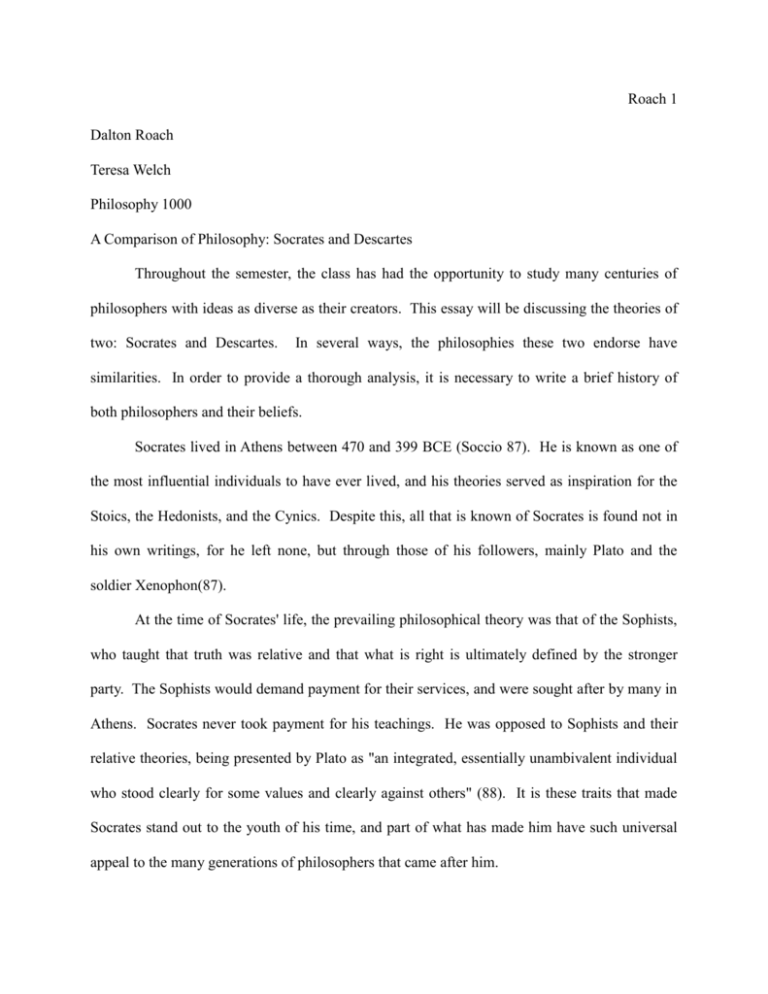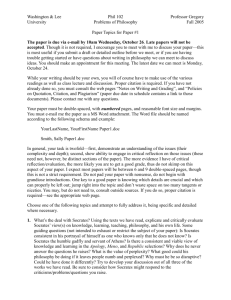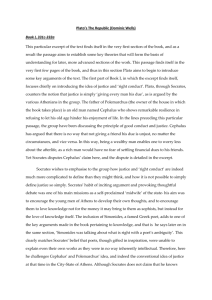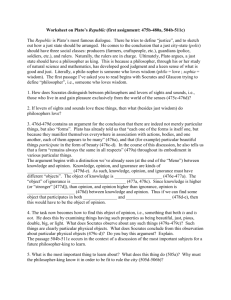Final Paper - WordPress.com
advertisement

Roach 1 Dalton Roach Teresa Welch Philosophy 1000 A Comparison of Philosophy: Socrates and Descartes Throughout the semester, the class has had the opportunity to study many centuries of philosophers with ideas as diverse as their creators. This essay will be discussing the theories of two: Socrates and Descartes. In several ways, the philosophies these two endorse have similarities. In order to provide a thorough analysis, it is necessary to write a brief history of both philosophers and their beliefs. Socrates lived in Athens between 470 and 399 BCE (Soccio 87). He is known as one of the most influential individuals to have ever lived, and his theories served as inspiration for the Stoics, the Hedonists, and the Cynics. Despite this, all that is known of Socrates is found not in his own writings, for he left none, but through those of his followers, mainly Plato and the soldier Xenophon(87). At the time of Socrates' life, the prevailing philosophical theory was that of the Sophists, who taught that truth was relative and that what is right is ultimately defined by the stronger party. The Sophists would demand payment for their services, and were sought after by many in Athens. Socrates never took payment for his teachings. He was opposed to Sophists and their relative theories, being presented by Plato as "an integrated, essentially unambivalent individual who stood clearly for some values and clearly against others" (88). It is these traits that made Socrates stand out to the youth of his time, and part of what has made him have such universal appeal to the many generations of philosophers that came after him. Roach 2 Socrates taught that "the true self is not the body but the soul" (Soccio 88). His definition of the soul was at the time unique; according to Giovanni Reale: no on prior to Socrates had understood by soul what Socrates understood by it, and after Socrates the whole of the West... The soul for Socrates was identified with our consciousness when it thinks and acts with our reason and with the source of our thinking activity and our ethical activity. In short, for Socrates the soul is the conscious self, it is intellectual and moral personhood." (Soccio 102) This definition helps explain many of the ideas Socrates taught. One of these ideas is that beauty and goodness are not a matter of the way the body looks or external conditions, respectively, but "a matter of inner qualities" (88). The world at large has always placed great emphasis on external beauty as a means of judging worth. Perhaps no age is more guilty of this than the modern age, with the methods of distribution that have never before been possible spreading advertisements that tell consumers what love is, what it is to be beautiful, and that they are failing if they do not match the perfection of the manipulated images of the perfect people seen smiling up from the screen or page. If a greater emphasis was placed on inner beauty and self-worth in the education of adolescents according to this principle of Socrates' teachings, it would help to alleviate many of the issues that arise with damaged self-image among that demographic for the rest of their lives. One of his most famous sayings is "know thyself." In a dialogue between Euthydemus and Socrates, the sophos reveals that this phrase comes from the wall of the temple in Delphi. He was trying to encourage people to "attend to [the phrase 'know thyself']," and "try to examine" themselves, and "ascertain what sort of character" they are (Soccio 108). Socrates Roach 3 believed that "the unexamined life was not worth living" (102). Without questioning the customs of the culture, without considering what the individual desires, without ever thinking about anything beyond attending to the day-to-day tasks of the status quo, a life is incomplete and unsatisfactory. Here, again, it is relevant to bring up the bombardment of modern day media. In an article published in the New York Times it states that the average person living in the city sees up to 5,000 ads per day (Story). This astounding number of ads all try to do what the Sophists did: they attempt to convince the general public that if they pay these companies, they know what will bring them happiness, good family relationships, passionate significant others, and much more. By "knowing themselves," and what is truly important to them, the American people can safeguard themselves against this onslaught. Ultimately, the people of Athens found Socrates' questioning of fundamental Athenian values and beliefs to be "undemocratic, disrespectful, and threatening". He was accused of "not worshipping the gods of the state" and "corrupting the young" (Soccio 111). Socrates could have chosen a life of exile, as was the custom for charges of these kind, but instead he chose to face the trial. He didn't "tear at [his] clothes, roll on the ground, and throw dirt on [himself] while crying and wailing" to convince the jury to have mercy on him (112). Due to the trial entering into a holy season, there was a month before his execution. He was given ample opportunity to escape, "the officials going so far as to make it clear they would not stop him" (113). Instead, Socrates chose to die for his beliefs. This is what makes the story of Socrates speak so strongly to me. Right up until the very end, Socrates never wavered in what he believed. He felt that "to evade and fear death would have made a mockery out of his entire life" (114). Roach 4 René Descartes lived in France between 1596 and 1650. He was the first philosopher to study the process of thinking in itself (Soccio 247) and is considered the founder of modern philosophy. He cultivated a process of thinking called rationalism, wherein reason is the source from which all knowledge can be derived, and is superior to sense data (249). Rationalists used a proof called the "coherence theory of truth" in order to prove the truthfulness of something (249). To use this method, one takes the ideas they have already discovered to be true and build new ideas upon them. Ideas, if valid, will be consistent with each other. According to rationalists, some ideas of absolute truths could be obtained "without observation, experiment, or even experience." These were known as a priori or innate ideas (Soccio 249). Therefore it is possible to build knowledge entirely independent of sense data. This theory is in stark contrast with the correspondence theory of truth, which states essentially the exact opposite (250). Descartes warned against blindly accepting the ideas of those who came before us as facts. He felt that if we rely too much on what others have called truth, we become "infected with their errors, guard against them as we may" (Soccio 250). When we only rely on what those before us have done, we aren't truly thinking, just "memorizing." Instead, it is better to rely own our own reason and ideas. He states that if people just memorize the ideas of others, but have no intellectual insight on how to apply those ideas to a broader situation, then they have become "historians," not thinkers (250). Descartes has a very valid point. The structure of modern education is very much inspired by the Scholastic method of learning. In nearly everything that a student is required to do as a part of their studies, they must include references to where they got the idea in the first Roach 5 place. These outside ideas and already conceived notions then become the basis for which our own thinking patterns follow. It can be easy to forget that it is important to examine the information we gain, compare it against that which we already know, and expand upon it to make it useful in a wide variety of situations, not just memorize it for the next test. However, to truly gain anything at all from the experience, this is essential. Descartes stated that a method was necessary to begin an investigation of truth (Soccio 252). Part of his method was to always write in the first person, revealing his thought processes and how he reached his conclusions, as well as giving the reader a chance to follow the same mental paths that he did (253). He also applied a form of skepticism known as methodic doubt, stating "we must not accept anything we can doubt at all" (254). As part of this, he asked some very serious questions. What if this is all a dream? What if the world we are experiencing is really just a construct of our dreaming imagination? Or worse, what if there is an evil genius who is doing his utmost to deceive us into living in an artificial construct(Soccio 258) like the Matrix(Apoclyane)? Now comes the most important part of Descartes' theory: in order to go from doubting the world was anything more to an illusion to a verified existence, Descartes' first building block was epitomized in the famous phrase "I think, therefore I am" (Soccio 259). If everything else could be cast into doubt, there is at least one thing that is certain for Descartes: he is a thing which thinks (245). This bit of logic ultimately must be applied in the first person for every individual; it is not enough to say "someone else thinks, therefore they are," because we cannot verify anyone else's thoughts. I know I think, but I have no way of guaranteeing that anyone else does. Roach 6 The next logical building block for Descartes was what he called "the innate idea of God." He felt that the only way he could move beyond everything being mere ideas was if God truly existed. Due to the fact that we are not perfect, we couldn't possibly come up with the concept of a perfect being alone, and would need help to conceive of such a being. Therefore, Descartes concludes that to have the idea of a perfect God, the idea must be innate within him (Soccio 263). Once he has established these foundations, he then continues to add on more steps until he feels he has adequately built the world from the metaphorical ground up. He argues that he has a clear and distinct idea of his body, which must therefore exist, and that God would not deceive him into thinking the rest of the world beyond that is false. These two philosophers came from very different backgrounds and different goals to be accomplished. Despite this, there are similarities between them. One of the most striking is the similarity between the psyche and the cogito. As stated earlier, the soul for Socrates is a person's consciousness when it uses reason, and that it is the soul that is the true person, not the body. In other words, what a person truly is for Socrates, just as for Descartes, is "a thing which thinks." Both acknowledge that the body and the soul are two different things. The next point of interest is their epistemology. Socrates' method of teaching involved "drawing the truth" out of his students rather than "filling an empty vessel" (Soccio 95). This means that Socrates believed that truth was in each of us and all that had to be done was to bring it to the surface. This is a parallel to Descartes' a priori ideas. For Descartes these were innate in each of us. Another similarity is the method employed to bring about reason. Socrates claimed to Roach 7 know nothing, and through knowing nothing he taught his students all his lessons. Descartes, with his emphasis on not believing anything that had even a shadow of a doubt, decided to claim he could know nothing was real until he had built it up from clearly established ideas. In both of these philosopher's ends, claiming to know nothing was an essential tool to proving everything. One more likeness lies in who these philosophers were responding to. The sophists in Socrates' time claimed to know everything and that it was through paying them that others could gain this knowledge. The Scholastics in Descartes' time built all their reason and philosophy on the ideas of those who had come before, demanding thorough study of the previous philosophers before putting pen to paper. Both Socrates and Descartes were trying to shake up the people and convince them to rely on their own reasoning and intelligence to come up with ideas on how to live and how to think. Immanuel Kant elegantly captured the feeling of the philosophical enlightenment started by both Descartes and Socrates: "Dare to reason!...If I have a book which understands for me, a pastor who has a conscience for me, a doctor who decides my diet, I need not trouble myself. If I am willing to pay, others will do it for me" (Soccio 238). Both were trying to encourage people to reason and put an end to this kind of dangerous apathy. Socrates was always consistent with his overall theme, even choosing to die in order that his life's work would remain intact. In the case of Descartes' philosophy, however, there appears to be a few logical inconsistencies. Descartes claims that we should only rely on ideas which we can "clearly and distinctly" ascertain for ourselves (Soccio 254). Yet his definitions of "clear" and "distinct" are both pretty vague. He doesn't give much of a guideline for how to determine that an idea is "clear and distinct." Also, an issue I have with this theory is that something could be "clear and distinct" to my mind, yet it is wrong. The idea which seems so clear and distinct is Roach 8 based on false information and is not truth. Socrates used a series of questions to guide his students to answers that they would arrive at using their own powers of reason. He does not claim to have the knowledge, but instead is simply helping those seeking to learn to find it by asking questions they might not have considered. This works within his philosophical framework. Descartes, on the other hand, presents the idea of a priori ideas as things that each of us should just know. One of these is the idea of God. Being a religious person, the use of reason to attempt to prove the existence of God is something I can appreciate. However, the method Descartes uses is not one I think would be persuasive to everyone. The idea of God may be clear and distinct for Descartes, but it may not be as clear and distinct for another. Another difference is in their styles of spreading their philosophy. Socrates was out daily among the people, asking questions, provoking thought, inspiring change or frustrating the stagnant. Descartes, however, did most of his philosophy alone, preferring to be away from the world, believing that he could think better alone. As has been discussed in class, philosophy cannot be done in a vacuum. Descartes was a very intelligent man, but even he probably would have benefited from having another to bounce ideas off of. In short, these two philosophers use many of the same methods to approach wildly different projects. Descartes claimed nothing was real to prove that everything existed. Socrates claimed to know nothing to teach through asking questions. Both were archetypal figures who have inspired generations of philosophers after them. Roach 9 Works Cited Matrix Philosophy - The Cave. Dir. Lothair Apoclyane. YouTube, 23 Nov. 2008. Web. 20 Mar. 2012. <http://www.youtube.com/watch?v=N50NRQB99Sw>. Soccio, Douglas J. Archetypes of Wisdom: An Introduction to Philosophy. Australia: Wadsworth/Cengage Learning, 2010. Print. Story, Louise. "Anywhere the Eye Can See, It's Likely to See an Ad." NYTimes.com. The New York Times, 15 Jan. 2007. Web. 15 Mar. 2012. <http://www.nytimes.com/2007/01/15/business/media/15everywhere.html?_r=1&pagewanted=al l>.







